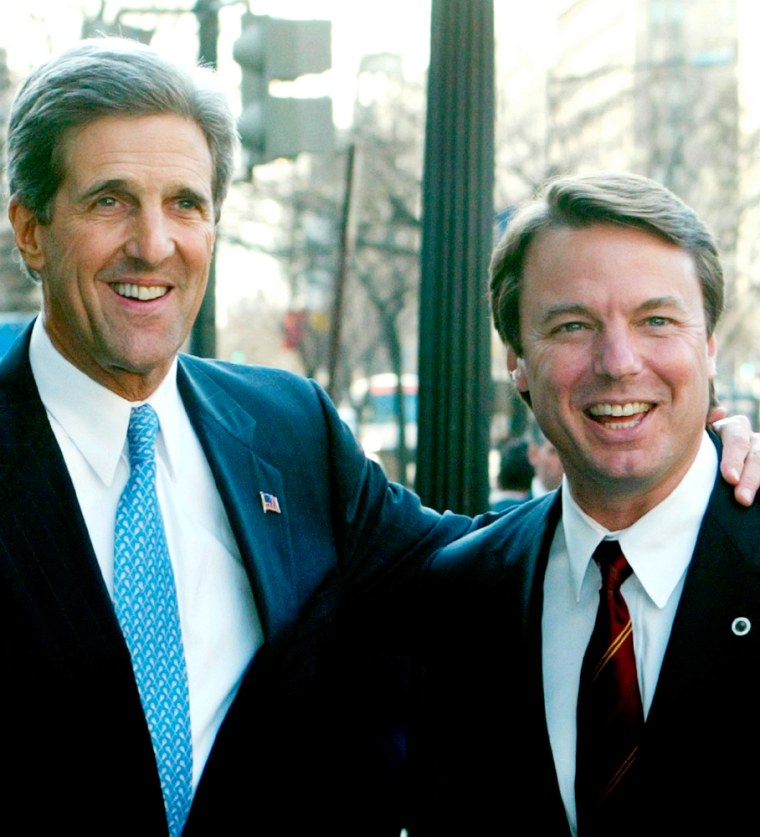While Democrats play the guessing game of who will John Kerry pick as his running mate, those under consideration play the agonizing waiting game that will end with all but one of them as wallflowers.
“Everyone is ambitious no matter what they say,” said James Thurber of the Center for Congressional and Presidential Studies at The American University. “Everybody is in love and think they are the one going to the prom.”
Will it be the charismatic Sen. John Edwards of North Carolina. Or will it be Rep. Dick Gephardt of Missouri, a favorite of organized labor? Or will it be any one of another dozen or so big-name Democrats widely seen as contenders?
“It is sort of a strange dance,” Stephen Hess, a congressional scholar at the Brookings Institution, a Washington think tank, said of the process that takes place every four years as party tickets are put together. “The presidential candidate wants to size up possible running mates and, in the process, generate a little interest in his campaign.”
Those seeking to get their dance cards punched face a tough screening process and potential heartbreak — yet they may also reap the ultimate political payoff.
Whoever is picked may not only be elected vice president in November but also — if Kerry would win two terms — become the Democrat’s presumptive presidential nominee in 2012.
Many of those seen as possibilities are colleagues of Kerry’s on Capitol Hill or governors of states that could be key on Election Day.
“My advice to them all is be yourself, follow the rules set by the Kerry campaign and know that the decision in the end rests with the candidate,” said Democratic Sen. Joseph Lieberman of Connecticut.
“And as much as possible enjoy it,” said Lieberman, who went through this wringer in 2000 before being picked as Al Gore’s running mate.
“There is a lot of pressure. First you are asked if you want to be considered, then you are told you are being considered, then you are told you are on the short list,” Lieberman said.
Check for blemishes
Along the way, candidates are checked for blemishes. Lieberman said in his case a team of lawyers reviewed his records — from taxes to editorials he wrote for his college newspaper.
Lieberman recalled that Warren Christopher, who headed Gore’s selection team, “told me this is going to be a very thorough process and it can be a painful process and, unfortunately, there is nothing you can do to remove the potential pain. You just have to live through it.”
Kerry and Edwards felt the pain in 2000. Both made Gore’s short list before Lieberman became the nominee.
Kerry is expected to announce a decision before he formally receives his party’s presidential nomination at next month’s Democratic national convention in Boston.
“Kerry has made it clear he wants to keep the process confidential,” Edwards said last week as he emerged from a Capitol Hill meeting with Kerry. “So I’m not going to say anything about it.”
Another potential running mate, Sen. Bill Nelson of Florida, said he has met with Kerry aides but considers himself “a long shot.”
“It’s not me,” Sen. Joseph Biden, a Delaware Democrat, blurted out when asked about speculation Kerry might pick him. “At least not that I’m aware of. No malarkey. I don’t want to be vice president.”
Biden said Kerry, unlike Gore in 2000, is not dangling the slot before potential nominees.
“Gore implied he was thinking about everyone in the Senate,” Biden said. “John is not doing that.”
“I do not believe that anyone knows who John is going to pick. And I think that’s causing — for those who want to be vice president — a lot of anxiety,” said Biden, standing outside the Senate. “He was up here the other day. Some are saying, ‘Hey, he didn’t talk to me.”’
